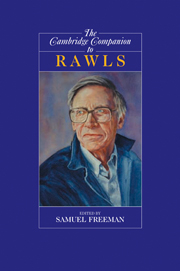Book contents
- Frontmatter
- Introduction
- 1 Rawls and Liberalism
- 2 For a Democratic Society
- 3 Rawls on Justification
- 4 Rawls on the Relationship between Liberalism and Democracy
- 5 Difference Principles
- 6 Democratic Equality
- 7 Congruence and the Good of Justice
- 8 On Rawls and Political Liberalism
- 9 Constructivism in Rawls and Kant
- 10 Public Reason
- 11 Rawls on Constitutionalism and Constitutional Law
- 12 Rawls and Utilitarianism
- 13 Rawls and Communitarianism
- 14 Rawls and Feminism
- Bibliography
- Index
1 - Rawls and Liberalism
Published online by Cambridge University Press: 28 May 2006
- Frontmatter
- Introduction
- 1 Rawls and Liberalism
- 2 For a Democratic Society
- 3 Rawls on Justification
- 4 Rawls on the Relationship between Liberalism and Democracy
- 5 Difference Principles
- 6 Democratic Equality
- 7 Congruence and the Good of Justice
- 8 On Rawls and Political Liberalism
- 9 Constructivism in Rawls and Kant
- 10 Public Reason
- 11 Rawls on Constitutionalism and Constitutional Law
- 12 Rawls and Utilitarianism
- 13 Rawls and Communitarianism
- 14 Rawls and Feminism
- Bibliography
- Index
Summary
“Liberalism” means different things to different people. The term is currently used in Europe by the left to castigate the right for blind faith in the value of an unfettered market economy and insufficient attention to the importance of state action in realizing the values of equality and social justice. (Sometimes this usage is marked by the variants “neoliberalism” or “ultraliberalism.”) In the United States, on the other hand, the term is used by the right to castigate the left for unrealistic attachment to the values of social and economic equality and the too ready use of government power to pursue those ends at the cost of individual freedom and initiative. Thus, American Republicans who condemn the Democrats as bleeding-heart liberals are precisely the sort of people who are condemned as heartless liberals by French Socialists.
Both of these radically opposed pejorative uses have some basis in the broad tradition of liberalism as a group of political movements and political ideas, sharing certain convictions and disagreeing about others. It is a significant fact about our age that most political argument in the Western world now goes on between different branches of that tradition. Its great historical figures are Locke, Rousseau, Constant, Kant, and Mill, and, in our century, its intellectual representatives have included Dewey, Orwell, Hayek, Aron, Hart, Berlin, and many others.With the recent spread of democracy, liberalism has become politically important in countries throughout the world.
- Type
- Chapter
- Information
- The Cambridge Companion to Rawls , pp. 62 - 85Publisher: Cambridge University PressPrint publication year: 2002
- 12
- Cited by



